Research Proposal: Globalisation's Impact on Vodafone PLC Trade
VerifiedAdded on 2020/12/10
|9
|2507
|447
Report
AI Summary
This research proposal investigates the impact of globalisation on the trade of Vodafone PLC, a British telecommunications company operating globally. The study aims to understand the concept of globalisation, evaluate its impact on Vodafone's trade, analyze the challenges of operating internationally, and recommend strategies to overcome globalisation barriers. The proposal outlines a literature review covering the concept of globalisation, its impact on Vodafone's trade, and the issues that arise, such as political risks, accounting differences, and foreign regulations. The research methodology involves a qualitative approach using questionnaires to collect primary data, supplemented by secondary data from online sources and academic journals. Thematic analysis will be employed for data analysis, leading to findings, conclusions, and recommendations for Vodafone PLC. The research will explore how globalisation affects Vodafone's sales, profitability, and productivity, as well as the role of management in adapting to external changes and consumer preferences. The proposal also highlights the importance of understanding cultural differences, consumer demand, and implementing effective marketing strategies to succeed in the global market. The conclusion will summarize the positive and negative impacts of globalisation on Vodafone PLC, and recommendations will provide insights into resolving the identified issues and enhancing international operations.
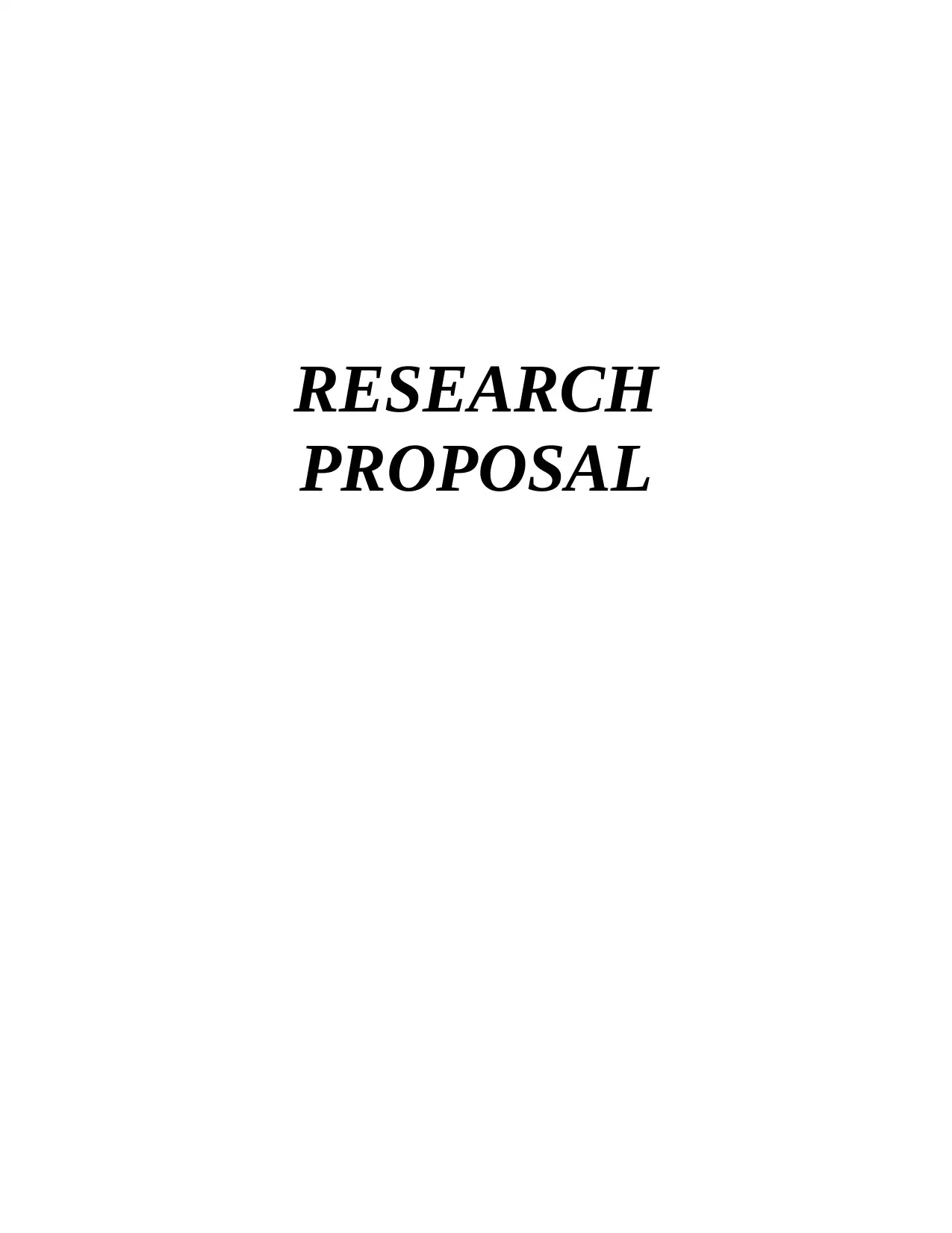
RESEARCH
PROPOSAL
PROPOSAL
Paraphrase This Document
Need a fresh take? Get an instant paraphrase of this document with our AI Paraphraser
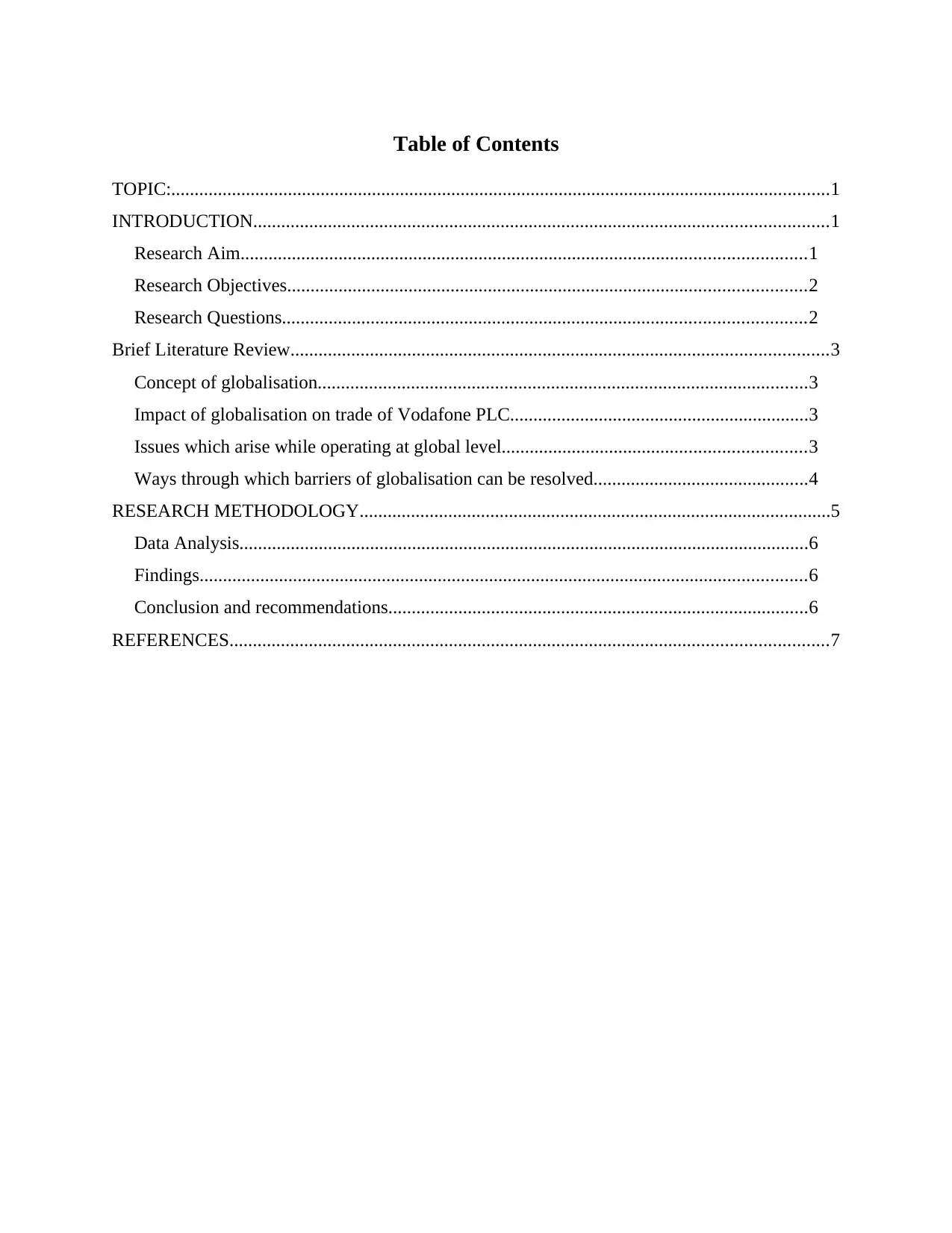
Table of Contents
TOPIC:.............................................................................................................................................1
INTRODUCTION...........................................................................................................................1
Research Aim.........................................................................................................................1
Research Objectives...............................................................................................................2
Research Questions................................................................................................................2
Brief Literature Review...................................................................................................................3
Concept of globalisation.........................................................................................................3
Impact of globalisation on trade of Vodafone PLC................................................................3
Issues which arise while operating at global level.................................................................3
Ways through which barriers of globalisation can be resolved..............................................4
RESEARCH METHODOLOGY.....................................................................................................5
Data Analysis..........................................................................................................................6
Findings..................................................................................................................................6
Conclusion and recommendations..........................................................................................6
REFERENCES................................................................................................................................7
TOPIC:.............................................................................................................................................1
INTRODUCTION...........................................................................................................................1
Research Aim.........................................................................................................................1
Research Objectives...............................................................................................................2
Research Questions................................................................................................................2
Brief Literature Review...................................................................................................................3
Concept of globalisation.........................................................................................................3
Impact of globalisation on trade of Vodafone PLC................................................................3
Issues which arise while operating at global level.................................................................3
Ways through which barriers of globalisation can be resolved..............................................4
RESEARCH METHODOLOGY.....................................................................................................5
Data Analysis..........................................................................................................................6
Findings..................................................................................................................................6
Conclusion and recommendations..........................................................................................6
REFERENCES................................................................................................................................7
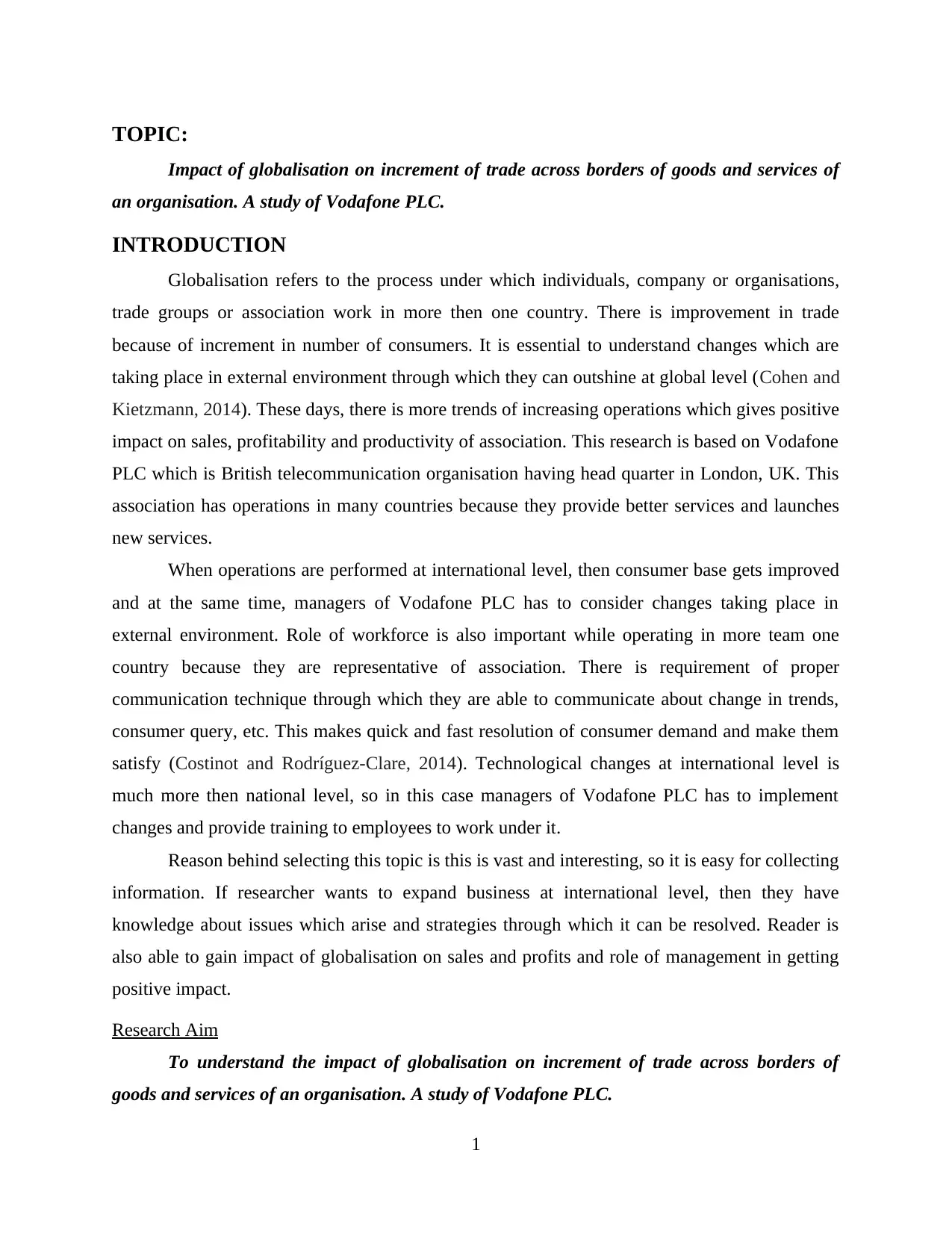
TOPIC:
Impact of globalisation on increment of trade across borders of goods and services of
an organisation. A study of Vodafone PLC.
INTRODUCTION
Globalisation refers to the process under which individuals, company or organisations,
trade groups or association work in more then one country. There is improvement in trade
because of increment in number of consumers. It is essential to understand changes which are
taking place in external environment through which they can outshine at global level (Cohen and
Kietzmann, 2014). These days, there is more trends of increasing operations which gives positive
impact on sales, profitability and productivity of association. This research is based on Vodafone
PLC which is British telecommunication organisation having head quarter in London, UK. This
association has operations in many countries because they provide better services and launches
new services.
When operations are performed at international level, then consumer base gets improved
and at the same time, managers of Vodafone PLC has to consider changes taking place in
external environment. Role of workforce is also important while operating in more team one
country because they are representative of association. There is requirement of proper
communication technique through which they are able to communicate about change in trends,
consumer query, etc. This makes quick and fast resolution of consumer demand and make them
satisfy (Costinot and Rodríguez-Clare, 2014). Technological changes at international level is
much more then national level, so in this case managers of Vodafone PLC has to implement
changes and provide training to employees to work under it.
Reason behind selecting this topic is this is vast and interesting, so it is easy for collecting
information. If researcher wants to expand business at international level, then they have
knowledge about issues which arise and strategies through which it can be resolved. Reader is
also able to gain impact of globalisation on sales and profits and role of management in getting
positive impact.
Research Aim
To understand the impact of globalisation on increment of trade across borders of
goods and services of an organisation. A study of Vodafone PLC.
1
Impact of globalisation on increment of trade across borders of goods and services of
an organisation. A study of Vodafone PLC.
INTRODUCTION
Globalisation refers to the process under which individuals, company or organisations,
trade groups or association work in more then one country. There is improvement in trade
because of increment in number of consumers. It is essential to understand changes which are
taking place in external environment through which they can outshine at global level (Cohen and
Kietzmann, 2014). These days, there is more trends of increasing operations which gives positive
impact on sales, profitability and productivity of association. This research is based on Vodafone
PLC which is British telecommunication organisation having head quarter in London, UK. This
association has operations in many countries because they provide better services and launches
new services.
When operations are performed at international level, then consumer base gets improved
and at the same time, managers of Vodafone PLC has to consider changes taking place in
external environment. Role of workforce is also important while operating in more team one
country because they are representative of association. There is requirement of proper
communication technique through which they are able to communicate about change in trends,
consumer query, etc. This makes quick and fast resolution of consumer demand and make them
satisfy (Costinot and Rodríguez-Clare, 2014). Technological changes at international level is
much more then national level, so in this case managers of Vodafone PLC has to implement
changes and provide training to employees to work under it.
Reason behind selecting this topic is this is vast and interesting, so it is easy for collecting
information. If researcher wants to expand business at international level, then they have
knowledge about issues which arise and strategies through which it can be resolved. Reader is
also able to gain impact of globalisation on sales and profits and role of management in getting
positive impact.
Research Aim
To understand the impact of globalisation on increment of trade across borders of
goods and services of an organisation. A study of Vodafone PLC.
1
⊘ This is a preview!⊘
Do you want full access?
Subscribe today to unlock all pages.

Trusted by 1+ million students worldwide
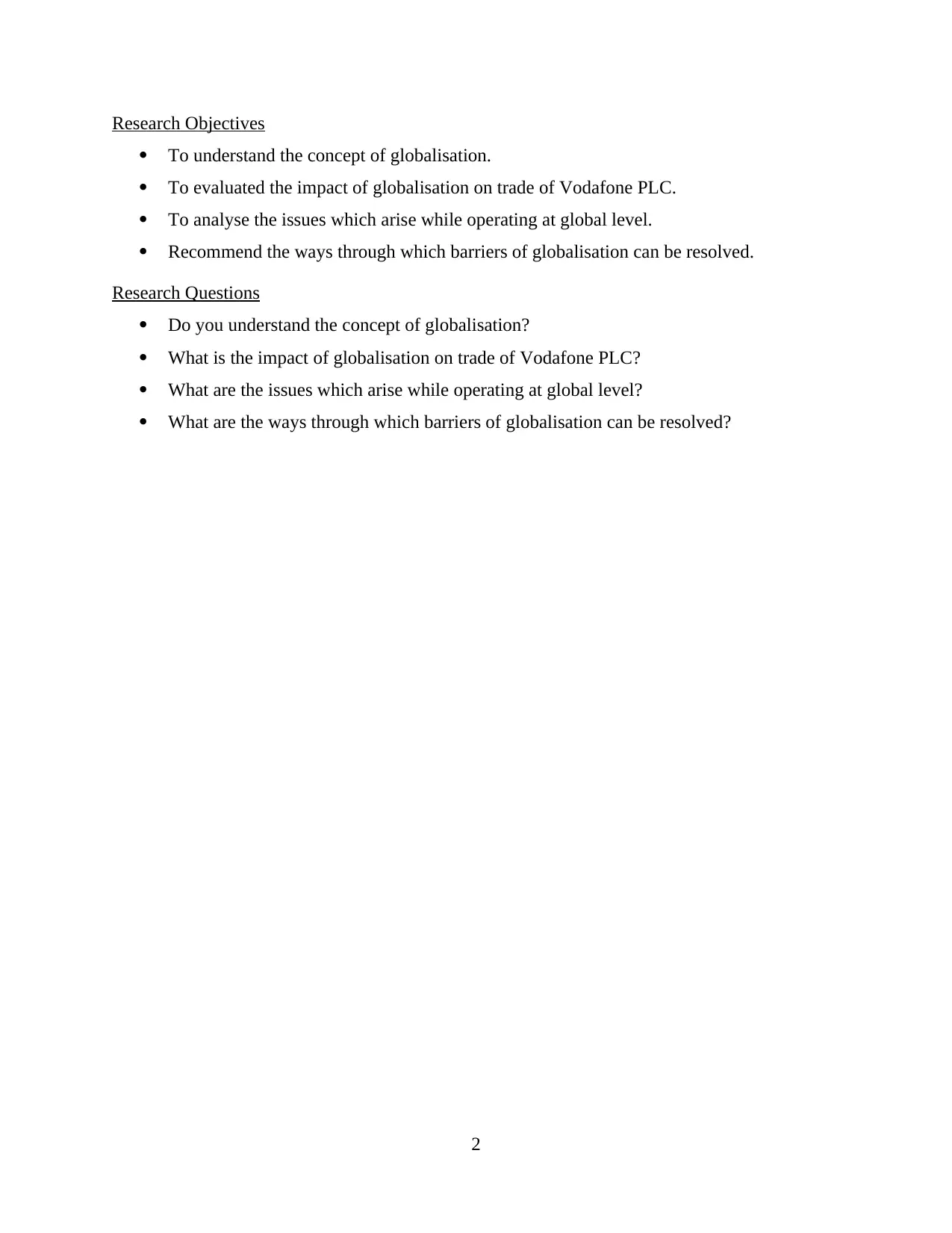
Research Objectives
To understand the concept of globalisation.
To evaluated the impact of globalisation on trade of Vodafone PLC.
To analyse the issues which arise while operating at global level.
Recommend the ways through which barriers of globalisation can be resolved.
Research Questions
Do you understand the concept of globalisation?
What is the impact of globalisation on trade of Vodafone PLC?
What are the issues which arise while operating at global level?
What are the ways through which barriers of globalisation can be resolved?
2
To understand the concept of globalisation.
To evaluated the impact of globalisation on trade of Vodafone PLC.
To analyse the issues which arise while operating at global level.
Recommend the ways through which barriers of globalisation can be resolved.
Research Questions
Do you understand the concept of globalisation?
What is the impact of globalisation on trade of Vodafone PLC?
What are the issues which arise while operating at global level?
What are the ways through which barriers of globalisation can be resolved?
2
Paraphrase This Document
Need a fresh take? Get an instant paraphrase of this document with our AI Paraphraser
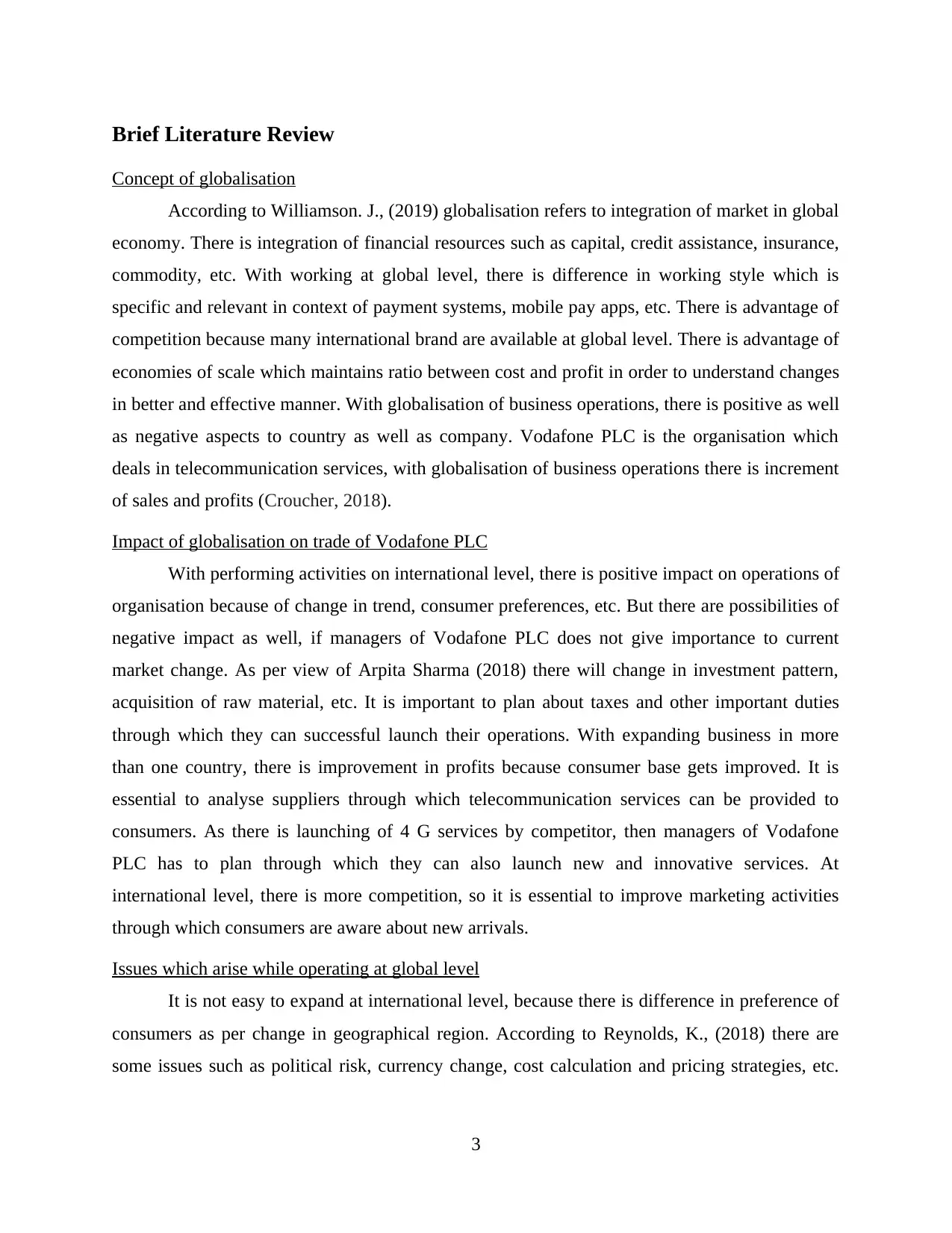
Brief Literature Review
Concept of globalisation
According to Williamson. J., (2019) globalisation refers to integration of market in global
economy. There is integration of financial resources such as capital, credit assistance, insurance,
commodity, etc. With working at global level, there is difference in working style which is
specific and relevant in context of payment systems, mobile pay apps, etc. There is advantage of
competition because many international brand are available at global level. There is advantage of
economies of scale which maintains ratio between cost and profit in order to understand changes
in better and effective manner. With globalisation of business operations, there is positive as well
as negative aspects to country as well as company. Vodafone PLC is the organisation which
deals in telecommunication services, with globalisation of business operations there is increment
of sales and profits (Croucher, 2018).
Impact of globalisation on trade of Vodafone PLC
With performing activities on international level, there is positive impact on operations of
organisation because of change in trend, consumer preferences, etc. But there are possibilities of
negative impact as well, if managers of Vodafone PLC does not give importance to current
market change. As per view of Arpita Sharma (2018) there will change in investment pattern,
acquisition of raw material, etc. It is important to plan about taxes and other important duties
through which they can successful launch their operations. With expanding business in more
than one country, there is improvement in profits because consumer base gets improved. It is
essential to analyse suppliers through which telecommunication services can be provided to
consumers. As there is launching of 4 G services by competitor, then managers of Vodafone
PLC has to plan through which they can also launch new and innovative services. At
international level, there is more competition, so it is essential to improve marketing activities
through which consumers are aware about new arrivals.
Issues which arise while operating at global level
It is not easy to expand at international level, because there is difference in preference of
consumers as per change in geographical region. According to Reynolds, K., (2018) there are
some issues such as political risk, currency change, cost calculation and pricing strategies, etc.
3
Concept of globalisation
According to Williamson. J., (2019) globalisation refers to integration of market in global
economy. There is integration of financial resources such as capital, credit assistance, insurance,
commodity, etc. With working at global level, there is difference in working style which is
specific and relevant in context of payment systems, mobile pay apps, etc. There is advantage of
competition because many international brand are available at global level. There is advantage of
economies of scale which maintains ratio between cost and profit in order to understand changes
in better and effective manner. With globalisation of business operations, there is positive as well
as negative aspects to country as well as company. Vodafone PLC is the organisation which
deals in telecommunication services, with globalisation of business operations there is increment
of sales and profits (Croucher, 2018).
Impact of globalisation on trade of Vodafone PLC
With performing activities on international level, there is positive impact on operations of
organisation because of change in trend, consumer preferences, etc. But there are possibilities of
negative impact as well, if managers of Vodafone PLC does not give importance to current
market change. As per view of Arpita Sharma (2018) there will change in investment pattern,
acquisition of raw material, etc. It is important to plan about taxes and other important duties
through which they can successful launch their operations. With expanding business in more
than one country, there is improvement in profits because consumer base gets improved. It is
essential to analyse suppliers through which telecommunication services can be provided to
consumers. As there is launching of 4 G services by competitor, then managers of Vodafone
PLC has to plan through which they can also launch new and innovative services. At
international level, there is more competition, so it is essential to improve marketing activities
through which consumers are aware about new arrivals.
Issues which arise while operating at global level
It is not easy to expand at international level, because there is difference in preference of
consumers as per change in geographical region. According to Reynolds, K., (2018) there are
some issues such as political risk, currency change, cost calculation and pricing strategies, etc.
3
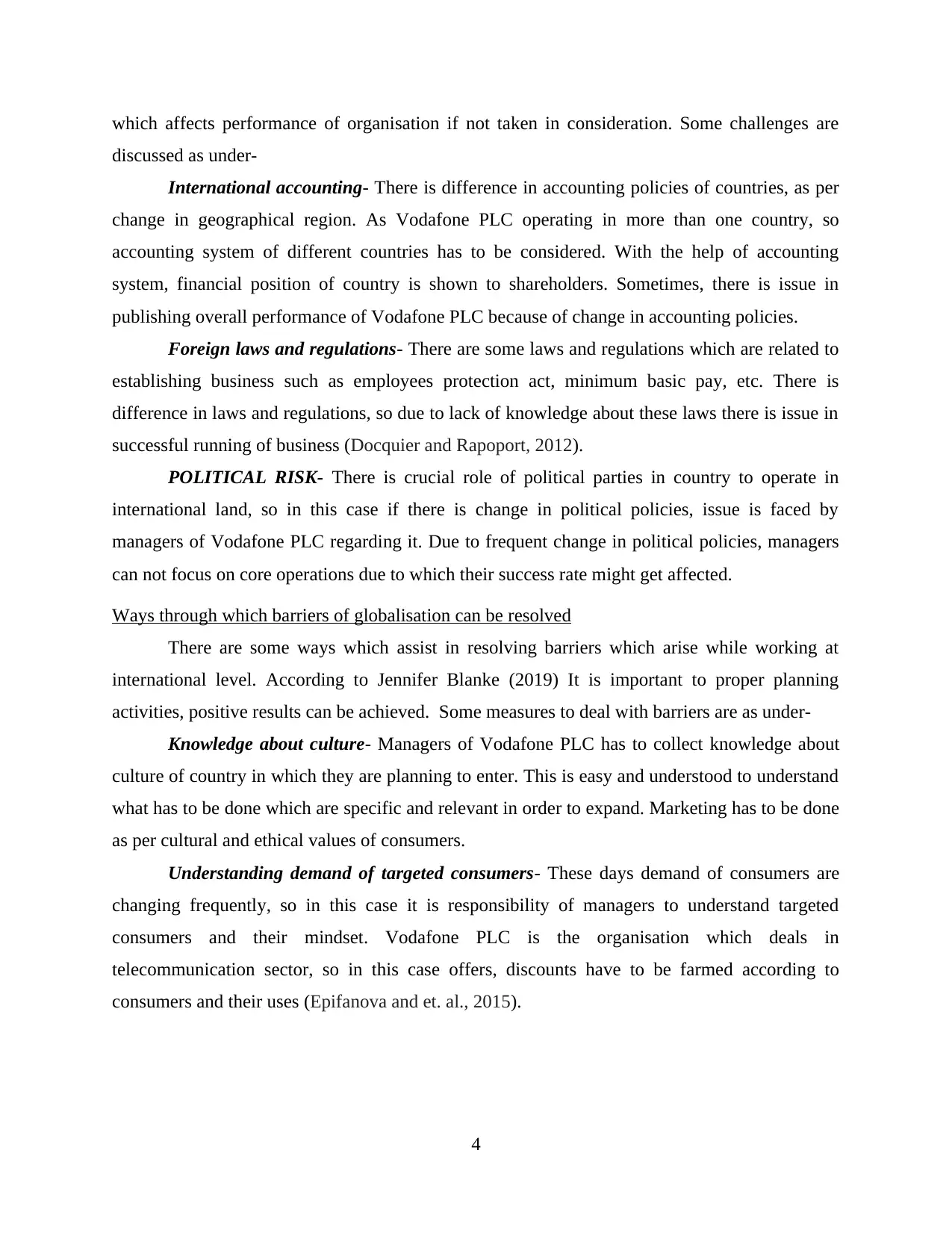
which affects performance of organisation if not taken in consideration. Some challenges are
discussed as under-
International accounting- There is difference in accounting policies of countries, as per
change in geographical region. As Vodafone PLC operating in more than one country, so
accounting system of different countries has to be considered. With the help of accounting
system, financial position of country is shown to shareholders. Sometimes, there is issue in
publishing overall performance of Vodafone PLC because of change in accounting policies.
Foreign laws and regulations- There are some laws and regulations which are related to
establishing business such as employees protection act, minimum basic pay, etc. There is
difference in laws and regulations, so due to lack of knowledge about these laws there is issue in
successful running of business (Docquier and Rapoport, 2012).
POLITICAL RISK- There is crucial role of political parties in country to operate in
international land, so in this case if there is change in political policies, issue is faced by
managers of Vodafone PLC regarding it. Due to frequent change in political policies, managers
can not focus on core operations due to which their success rate might get affected.
Ways through which barriers of globalisation can be resolved
There are some ways which assist in resolving barriers which arise while working at
international level. According to Jennifer Blanke (2019) It is important to proper planning
activities, positive results can be achieved. Some measures to deal with barriers are as under-
Knowledge about culture- Managers of Vodafone PLC has to collect knowledge about
culture of country in which they are planning to enter. This is easy and understood to understand
what has to be done which are specific and relevant in order to expand. Marketing has to be done
as per cultural and ethical values of consumers.
Understanding demand of targeted consumers- These days demand of consumers are
changing frequently, so in this case it is responsibility of managers to understand targeted
consumers and their mindset. Vodafone PLC is the organisation which deals in
telecommunication sector, so in this case offers, discounts have to be farmed according to
consumers and their uses (Epifanova and et. al., 2015).
4
discussed as under-
International accounting- There is difference in accounting policies of countries, as per
change in geographical region. As Vodafone PLC operating in more than one country, so
accounting system of different countries has to be considered. With the help of accounting
system, financial position of country is shown to shareholders. Sometimes, there is issue in
publishing overall performance of Vodafone PLC because of change in accounting policies.
Foreign laws and regulations- There are some laws and regulations which are related to
establishing business such as employees protection act, minimum basic pay, etc. There is
difference in laws and regulations, so due to lack of knowledge about these laws there is issue in
successful running of business (Docquier and Rapoport, 2012).
POLITICAL RISK- There is crucial role of political parties in country to operate in
international land, so in this case if there is change in political policies, issue is faced by
managers of Vodafone PLC regarding it. Due to frequent change in political policies, managers
can not focus on core operations due to which their success rate might get affected.
Ways through which barriers of globalisation can be resolved
There are some ways which assist in resolving barriers which arise while working at
international level. According to Jennifer Blanke (2019) It is important to proper planning
activities, positive results can be achieved. Some measures to deal with barriers are as under-
Knowledge about culture- Managers of Vodafone PLC has to collect knowledge about
culture of country in which they are planning to enter. This is easy and understood to understand
what has to be done which are specific and relevant in order to expand. Marketing has to be done
as per cultural and ethical values of consumers.
Understanding demand of targeted consumers- These days demand of consumers are
changing frequently, so in this case it is responsibility of managers to understand targeted
consumers and their mindset. Vodafone PLC is the organisation which deals in
telecommunication sector, so in this case offers, discounts have to be farmed according to
consumers and their uses (Epifanova and et. al., 2015).
4
⊘ This is a preview!⊘
Do you want full access?
Subscribe today to unlock all pages.

Trusted by 1+ million students worldwide
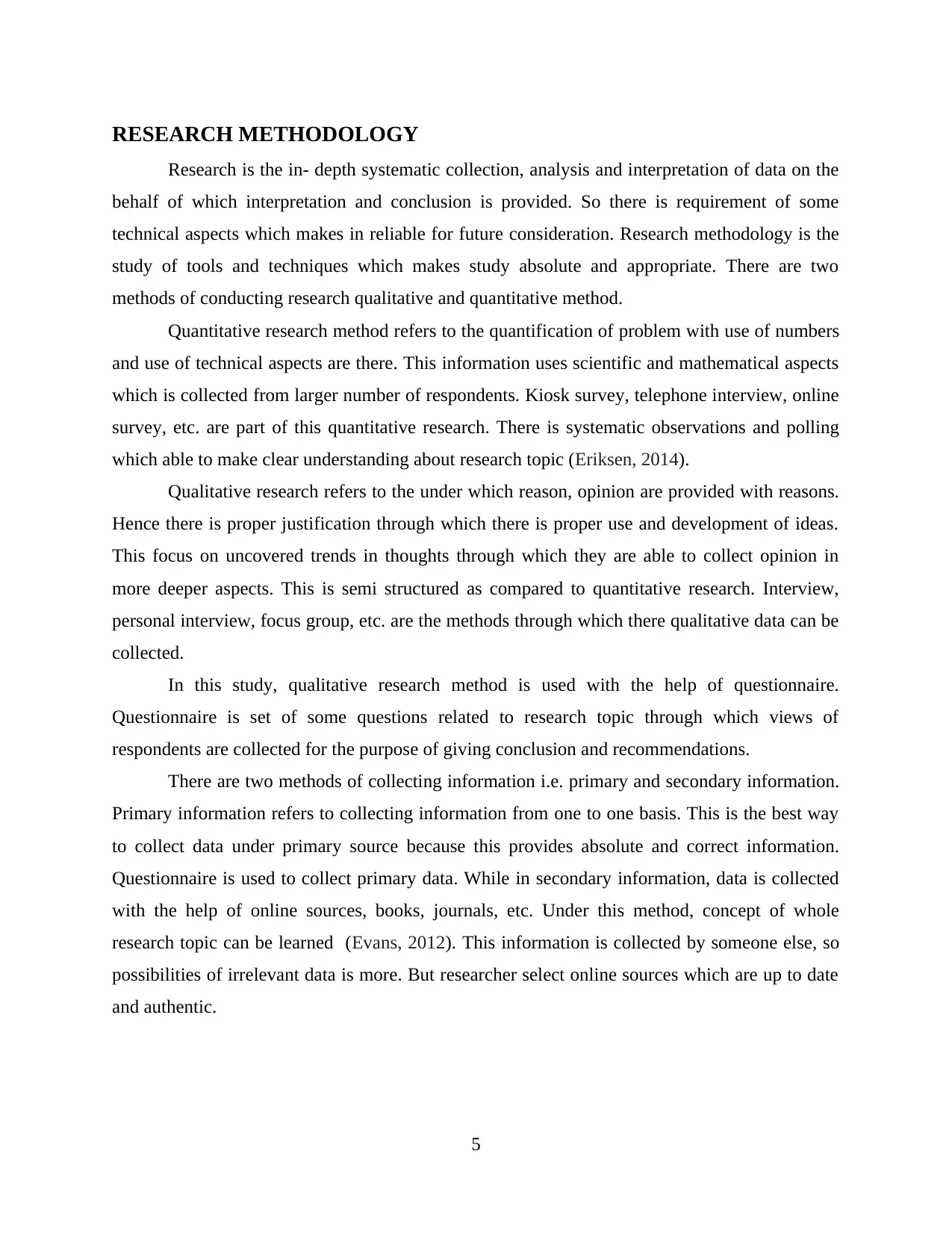
RESEARCH METHODOLOGY
Research is the in- depth systematic collection, analysis and interpretation of data on the
behalf of which interpretation and conclusion is provided. So there is requirement of some
technical aspects which makes in reliable for future consideration. Research methodology is the
study of tools and techniques which makes study absolute and appropriate. There are two
methods of conducting research qualitative and quantitative method.
Quantitative research method refers to the quantification of problem with use of numbers
and use of technical aspects are there. This information uses scientific and mathematical aspects
which is collected from larger number of respondents. Kiosk survey, telephone interview, online
survey, etc. are part of this quantitative research. There is systematic observations and polling
which able to make clear understanding about research topic (Eriksen, 2014).
Qualitative research refers to the under which reason, opinion are provided with reasons.
Hence there is proper justification through which there is proper use and development of ideas.
This focus on uncovered trends in thoughts through which they are able to collect opinion in
more deeper aspects. This is semi structured as compared to quantitative research. Interview,
personal interview, focus group, etc. are the methods through which there qualitative data can be
collected.
In this study, qualitative research method is used with the help of questionnaire.
Questionnaire is set of some questions related to research topic through which views of
respondents are collected for the purpose of giving conclusion and recommendations.
There are two methods of collecting information i.e. primary and secondary information.
Primary information refers to collecting information from one to one basis. This is the best way
to collect data under primary source because this provides absolute and correct information.
Questionnaire is used to collect primary data. While in secondary information, data is collected
with the help of online sources, books, journals, etc. Under this method, concept of whole
research topic can be learned (Evans, 2012). This information is collected by someone else, so
possibilities of irrelevant data is more. But researcher select online sources which are up to date
and authentic.
5
Research is the in- depth systematic collection, analysis and interpretation of data on the
behalf of which interpretation and conclusion is provided. So there is requirement of some
technical aspects which makes in reliable for future consideration. Research methodology is the
study of tools and techniques which makes study absolute and appropriate. There are two
methods of conducting research qualitative and quantitative method.
Quantitative research method refers to the quantification of problem with use of numbers
and use of technical aspects are there. This information uses scientific and mathematical aspects
which is collected from larger number of respondents. Kiosk survey, telephone interview, online
survey, etc. are part of this quantitative research. There is systematic observations and polling
which able to make clear understanding about research topic (Eriksen, 2014).
Qualitative research refers to the under which reason, opinion are provided with reasons.
Hence there is proper justification through which there is proper use and development of ideas.
This focus on uncovered trends in thoughts through which they are able to collect opinion in
more deeper aspects. This is semi structured as compared to quantitative research. Interview,
personal interview, focus group, etc. are the methods through which there qualitative data can be
collected.
In this study, qualitative research method is used with the help of questionnaire.
Questionnaire is set of some questions related to research topic through which views of
respondents are collected for the purpose of giving conclusion and recommendations.
There are two methods of collecting information i.e. primary and secondary information.
Primary information refers to collecting information from one to one basis. This is the best way
to collect data under primary source because this provides absolute and correct information.
Questionnaire is used to collect primary data. While in secondary information, data is collected
with the help of online sources, books, journals, etc. Under this method, concept of whole
research topic can be learned (Evans, 2012). This information is collected by someone else, so
possibilities of irrelevant data is more. But researcher select online sources which are up to date
and authentic.
5
Paraphrase This Document
Need a fresh take? Get an instant paraphrase of this document with our AI Paraphraser
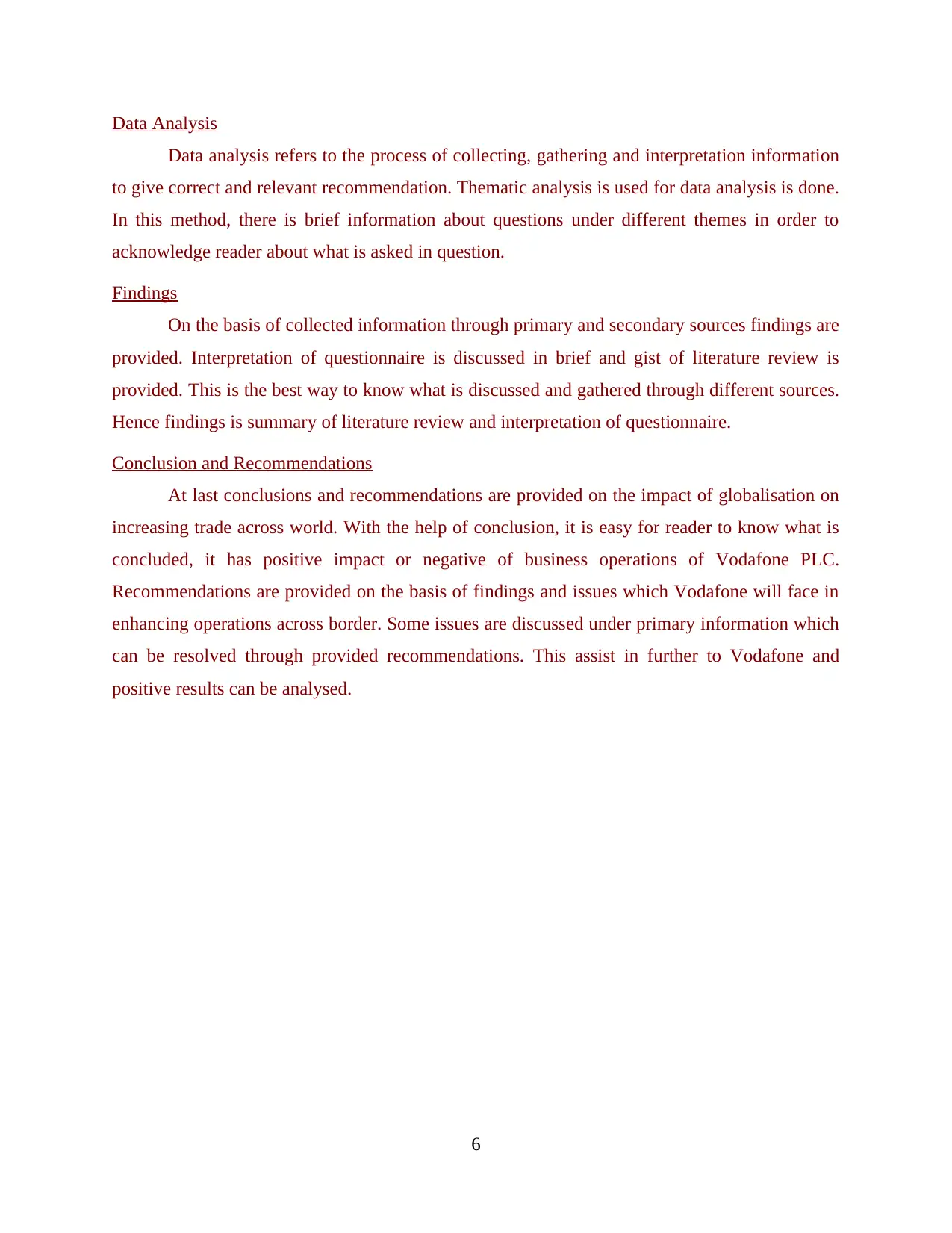
Data Analysis
Data analysis refers to the process of collecting, gathering and interpretation information
to give correct and relevant recommendation. Thematic analysis is used for data analysis is done.
In this method, there is brief information about questions under different themes in order to
acknowledge reader about what is asked in question.
Findings
On the basis of collected information through primary and secondary sources findings are
provided. Interpretation of questionnaire is discussed in brief and gist of literature review is
provided. This is the best way to know what is discussed and gathered through different sources.
Hence findings is summary of literature review and interpretation of questionnaire.
Conclusion and Recommendations
At last conclusions and recommendations are provided on the impact of globalisation on
increasing trade across world. With the help of conclusion, it is easy for reader to know what is
concluded, it has positive impact or negative of business operations of Vodafone PLC.
Recommendations are provided on the basis of findings and issues which Vodafone will face in
enhancing operations across border. Some issues are discussed under primary information which
can be resolved through provided recommendations. This assist in further to Vodafone and
positive results can be analysed.
6
Data analysis refers to the process of collecting, gathering and interpretation information
to give correct and relevant recommendation. Thematic analysis is used for data analysis is done.
In this method, there is brief information about questions under different themes in order to
acknowledge reader about what is asked in question.
Findings
On the basis of collected information through primary and secondary sources findings are
provided. Interpretation of questionnaire is discussed in brief and gist of literature review is
provided. This is the best way to know what is discussed and gathered through different sources.
Hence findings is summary of literature review and interpretation of questionnaire.
Conclusion and Recommendations
At last conclusions and recommendations are provided on the impact of globalisation on
increasing trade across world. With the help of conclusion, it is easy for reader to know what is
concluded, it has positive impact or negative of business operations of Vodafone PLC.
Recommendations are provided on the basis of findings and issues which Vodafone will face in
enhancing operations across border. Some issues are discussed under primary information which
can be resolved through provided recommendations. This assist in further to Vodafone and
positive results can be analysed.
6
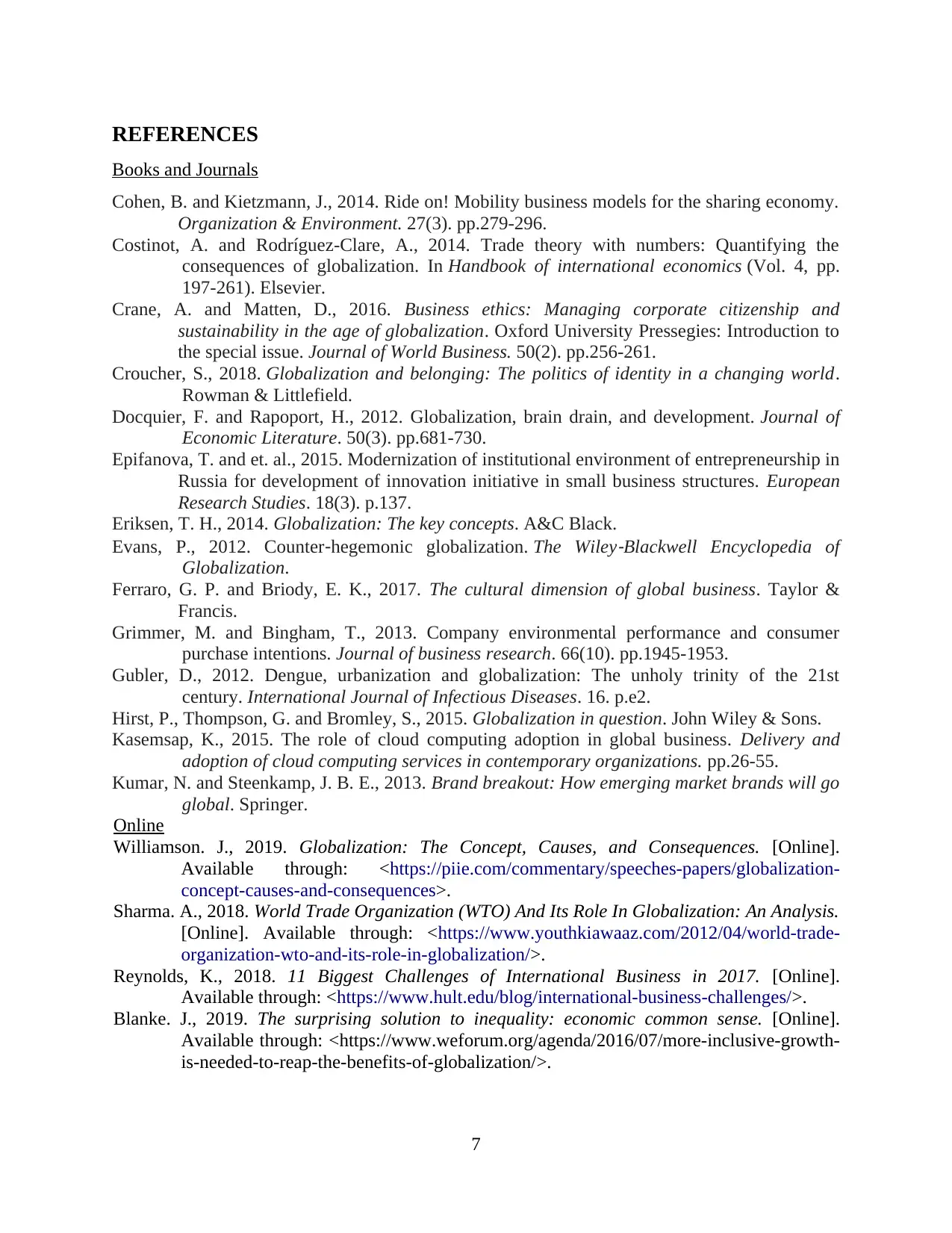
REFERENCES
Books and Journals
Cohen, B. and Kietzmann, J., 2014. Ride on! Mobility business models for the sharing economy.
Organization & Environment. 27(3). pp.279-296.
Costinot, A. and Rodríguez-Clare, A., 2014. Trade theory with numbers: Quantifying the
consequences of globalization. In Handbook of international economics (Vol. 4, pp.
197-261). Elsevier.
Crane, A. and Matten, D., 2016. Business ethics: Managing corporate citizenship and
sustainability in the age of globalization. Oxford University Pressegies: Introduction to
the special issue. Journal of World Business. 50(2). pp.256-261.
Croucher, S., 2018. Globalization and belonging: The politics of identity in a changing world.
Rowman & Littlefield.
Docquier, F. and Rapoport, H., 2012. Globalization, brain drain, and development. Journal of
Economic Literature. 50(3). pp.681-730.
Epifanova, T. and et. al., 2015. Modernization of institutional environment of entrepreneurship in
Russia for development of innovation initiative in small business structures. European
Research Studies. 18(3). p.137.
Eriksen, T. H., 2014. Globalization: The key concepts. A&C Black.
Evans, P., 2012. Counter‐hegemonic globalization. The Wiley
‐Blackwell Encyclopedia of
Globalization.
Ferraro, G. P. and Briody, E. K., 2017. The cultural dimension of global business. Taylor &
Francis.
Grimmer, M. and Bingham, T., 2013. Company environmental performance and consumer
purchase intentions. Journal of business research. 66(10). pp.1945-1953.
Gubler, D., 2012. Dengue, urbanization and globalization: The unholy trinity of the 21st
century. International Journal of Infectious Diseases. 16. p.e2.
Hirst, P., Thompson, G. and Bromley, S., 2015. Globalization in question. John Wiley & Sons.
Kasemsap, K., 2015. The role of cloud computing adoption in global business. Delivery and
adoption of cloud computing services in contemporary organizations. pp.26-55.
Kumar, N. and Steenkamp, J. B. E., 2013. Brand breakout: How emerging market brands will go
global. Springer.
Online
Williamson. J., 2019. Globalization: The Concept, Causes, and Consequences. [Online].
Available through: <https://piie.com/commentary/speeches-papers/globalization-
concept-causes-and-consequences>.
Sharma. A., 2018. World Trade Organization (WTO) And Its Role In Globalization: An Analysis.
[Online]. Available through: <https://www.youthkiawaaz.com/2012/04/world-trade-
organization-wto-and-its-role-in-globalization/>.
Reynolds, K., 2018. 11 Biggest Challenges of International Business in 2017. [Online].
Available through: <https://www.hult.edu/blog/international-business-challenges/>.
Blanke. J., 2019. The surprising solution to inequality: economic common sense. [Online].
Available through: <https://www.weforum.org/agenda/2016/07/more-inclusive-growth-
is-needed-to-reap-the-benefits-of-globalization/>.
7
Books and Journals
Cohen, B. and Kietzmann, J., 2014. Ride on! Mobility business models for the sharing economy.
Organization & Environment. 27(3). pp.279-296.
Costinot, A. and Rodríguez-Clare, A., 2014. Trade theory with numbers: Quantifying the
consequences of globalization. In Handbook of international economics (Vol. 4, pp.
197-261). Elsevier.
Crane, A. and Matten, D., 2016. Business ethics: Managing corporate citizenship and
sustainability in the age of globalization. Oxford University Pressegies: Introduction to
the special issue. Journal of World Business. 50(2). pp.256-261.
Croucher, S., 2018. Globalization and belonging: The politics of identity in a changing world.
Rowman & Littlefield.
Docquier, F. and Rapoport, H., 2012. Globalization, brain drain, and development. Journal of
Economic Literature. 50(3). pp.681-730.
Epifanova, T. and et. al., 2015. Modernization of institutional environment of entrepreneurship in
Russia for development of innovation initiative in small business structures. European
Research Studies. 18(3). p.137.
Eriksen, T. H., 2014. Globalization: The key concepts. A&C Black.
Evans, P., 2012. Counter‐hegemonic globalization. The Wiley
‐Blackwell Encyclopedia of
Globalization.
Ferraro, G. P. and Briody, E. K., 2017. The cultural dimension of global business. Taylor &
Francis.
Grimmer, M. and Bingham, T., 2013. Company environmental performance and consumer
purchase intentions. Journal of business research. 66(10). pp.1945-1953.
Gubler, D., 2012. Dengue, urbanization and globalization: The unholy trinity of the 21st
century. International Journal of Infectious Diseases. 16. p.e2.
Hirst, P., Thompson, G. and Bromley, S., 2015. Globalization in question. John Wiley & Sons.
Kasemsap, K., 2015. The role of cloud computing adoption in global business. Delivery and
adoption of cloud computing services in contemporary organizations. pp.26-55.
Kumar, N. and Steenkamp, J. B. E., 2013. Brand breakout: How emerging market brands will go
global. Springer.
Online
Williamson. J., 2019. Globalization: The Concept, Causes, and Consequences. [Online].
Available through: <https://piie.com/commentary/speeches-papers/globalization-
concept-causes-and-consequences>.
Sharma. A., 2018. World Trade Organization (WTO) And Its Role In Globalization: An Analysis.
[Online]. Available through: <https://www.youthkiawaaz.com/2012/04/world-trade-
organization-wto-and-its-role-in-globalization/>.
Reynolds, K., 2018. 11 Biggest Challenges of International Business in 2017. [Online].
Available through: <https://www.hult.edu/blog/international-business-challenges/>.
Blanke. J., 2019. The surprising solution to inequality: economic common sense. [Online].
Available through: <https://www.weforum.org/agenda/2016/07/more-inclusive-growth-
is-needed-to-reap-the-benefits-of-globalization/>.
7
⊘ This is a preview!⊘
Do you want full access?
Subscribe today to unlock all pages.

Trusted by 1+ million students worldwide
1 out of 9
Related Documents
Your All-in-One AI-Powered Toolkit for Academic Success.
+13062052269
info@desklib.com
Available 24*7 on WhatsApp / Email
![[object Object]](/_next/static/media/star-bottom.7253800d.svg)
Unlock your academic potential
Copyright © 2020–2026 A2Z Services. All Rights Reserved. Developed and managed by ZUCOL.





